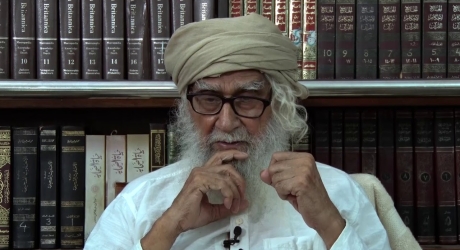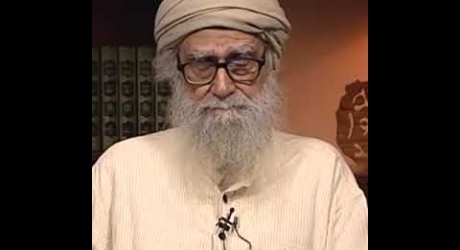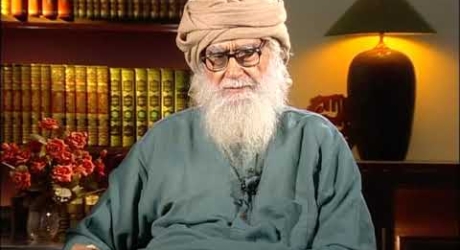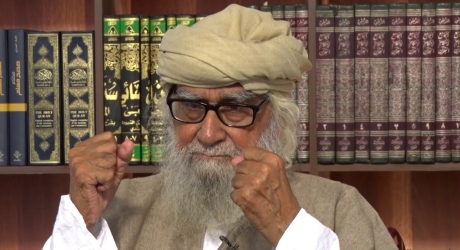The Quran tells us that man was created so that he might worship God. In the words of the Quran, “I created the Jinn and mankind only so that they might worship Me.” (51:56). In this verse, the worship of God means the realisation of God. Discovery of the realisation of God is, without doubt, the highest destination of anyone’s intellectual progress. The noblest is he who can attain this level of realisation. There are three kinds of such realisation. The experience of realisation of the first and second kinds has become a reality in history. So far as the realisation of the third kind is concerned, the prospect of it becoming a reality has become achievable only in the 20th century for the first time in history. The prophets achieved the experience of the first kind of discovery. This experience happened at the level of what is seen (ruyat). It is described in the Quran in this verse: “We showed Abraham our Kingdom of the heavens and the earth so that he might have certainty of faith.” (6:75). The words regarding the Prophet of Islam are similar. “And certainly he saw him descend a second time.” (53:13). This kind of realisation is attainable at the level of the seen. This realisation is reserved solely for the prophets. The second level of realisation is at the discovery of one’s helplessness. Man discovers his total helplessness as compared to the all-powerfulness of Almighty God. In this way, he achieves the realisation of God. It has been aptly described in these words attributed to the fourth caliph Ali: “I discovered my Lord by the shattering of my ambitions.” The third kind of realisation is at the voluntary or optional level. A man possessing total power discovers the Majesty of God and voluntarily surrenders himself before Him. This is no doubt the most challenging thing to do. When the philosophers and the theologians engaged in such discussions as ‘when God is almighty then man’s position is only of total helplessness,’ they concluded that the concept of man having power is only imaginary.
Introduction
While I was thinking on the topic of the Oneness of God, I realized that this was also the topic of my life. It would be no exaggeration to say that I spent my whole life in the search of God. I have been through many unique experiences during my quest to find God. For instance, during my youth I had read that Swami Vivekananda found truth along the sea shore in Kanyakumari. He is said to have meditated at a rock along the coast. Inspired by him, I set out to visit Kanyakumari - all the way from Azamgarh, where I lived. Upon reaching the site, I sat all alone in silence till the sunset and watched the waves as they crashed against the solid rocks. Despite this my inner being could not get satiated. My search therefore, did not end there.
During my days in Azamgarh, I once visited the Jama Masjid. As I stood underneath a papaya tree in mosque’s courtyard, the flowers that fell on the ground caught my attention. The experience became so overwhelming that it gave way to tears in my eyes. I cried out saying, “O! God when will You come? Till when shall I wait for You?” I have undergone numerous such experiences during my days of being a seeker. Looking back, I wonder how I met these challenges without giving up.
Why do we think about God?
The subject of God has two aspects, the psychological aspect and the scientific aspect. The scientific aspect demands that the discovery of God be logical or rational. The psychological aspect pertains to the inner urge in every man to seek God.
Studies in anthropological studies confirm that there has been no human society or any human being that were devoid of the concept of God. Though there existed in every age or society a negligible minority of individuals who denied God, the majority has always found solace in devoting themselves to God. These researches made me ponder upon the reason for such an occurrence.
I found the answer to this question in an instance from the life of Muhammad Ali Clay. He considered himself the ‘King of the world.’ Once he met a Guru who touched his soul so much that Ali surrendered before him. This story was published in Time and the author after conducting a psycho-analysis presented the reason for Ali’s behaviour. He wrote that even if man says that he is the ‘king of the world,’ he urges to have a bigger ‘king’ in front of whom he can bow or surrender. Man by nature wants somebody bigger or higher than him - a supernatural entity whom he can love the most. Till the time man does not find someone like this, he keeps making tall claims but upon finding such an entity, man truly surrenders himself.
I was born in a family of landlords and had all material comforts but it never satiated the quest within me. This was because I wanted the supernatural God. Ever since I discovered God (back during 1948), He became my supreme concern and today I can say that I love and fear God the most. The following verses in the Quran convey about a believer:
Those who believe will love God the most. (2:165)
who believes in God and stands in awe of none but God (9:18)
This was not an acquired trait. My nature wanted a Being like God Almighty whom I could devote my being to - love and also be afraid of. This is a case of all human beings.
Concept of God
According to my study, all religions have the concept of one God, but the definition of God varies. For example, Kabir said: Ek kahun tu hai nahin, dui kahun to gaal (If I say that God is one, it is not so, and if I say that there are two gods, it is blasphemous)
There are some others who consider God as mystery; there are others who don’t know whether God is one or more. The human nature doesn’t get addressed by the above concepts of God wherein He is regarded as a mystery. Man needs to understand God at the level of his conscious. God should be man’s discovery. When the Greek mathematician, Archimedes, discovered a principle of hydrostatics he was thrilled and shouted “Eureka!” If Archimedes would have received a mystery he would never have uttered ‘Eureka’. Hence any concept of God based on a mystery is not what we want. Such courses lead us only into confusion.
Psychological aspect of discovery
I once read a story that was based in the pre-aviation age. It told the tale of a ship that left America for a destination but while still in the middle of the Atlantic Ocean, met with a tumultuous storm. This aroused so much panic that all men and women started running helter-skelter. Running to save his life, a passenger noticed a small girl sitting calmly in a corner of the ship and busy playing with her doll. He said to the girl, “Don’t you know that the ship is going to sink?” The girl replied serenely, “You know, my father is the captain of the ship and he will not let it sink.” This was a remarkable statement, one that truly exemplified conviction. The young girl had immense conviction on her father even in the face of a life-threatening situation.
The young girl was satisfied with the father; because she was immature enough to understand his limitations as a human being. When I had matured, I could not be satisfied with my father and I sought a limitless Being. This story of the little girl made me realise the nature of man. We all get overwhelmed by a sense of helplessness. This helplessness brings man on the verge of seeking an entity he can truly trust. The girl trusted her father; I needed to trust upon God!
When I discovered God, I got the much yearned-for support and trust that I needed to lead my life. I therefore can say that I first discovered God on a psychological level although later I tested my discovery at the level of reason and logic and discovered Him rationally as well.
But the real discovery of God is done at a psychological level. Because if you discover God only through logic, He does not become your object of love. Only after discovering God at the psychological level, does one start loving Him the most. Had I discovered God on logic alone, my case would have been similar to that of philosophers who accepted the existence of God in some form or the other but God did not become their object of love. I did not want such a god. I wanted a God upon whom I could shower all my feelings of love. When I discovered such a God, I felt satiated.
My discovery of such a God happened through Quran. It is the only book that gives a complete introduction of God. All other books have been altered over a period of time. A small chapter in the Quran succinctly explains the concept of Oneness of God:
Say, He is God, the One, God, the Self-Sufficient One. He does not give birth, nor was He born, and there is nothing like Him. (Chapter 112)
Logical Aspect of discovery and the various models of God
History of thought had two periods: pre-scientific period and the post-scientific period. For the first time in the scientific period, an understanding of reason-based argument was developed, one that stood upon supporting documents. The approach before the scientific period was based on word play. There used to be mere utterance of words or analogies that actually proved nothing. In fact it was science that proved for the first time that analogy is the weakest form of argument.
For example, the proponents of monism (all is one) proclaim that truth is one and there are many paths to attain this truth. They say that if we take a drop from an ocean, the drop does not become a separate entity. If you put the drop back into the ocean, it becomes one with the ocean. This is a metaphor and does not prove anything. It is not applicable in the case of discovery of truth because here we want to know the truth and not the ways to attain it. It is similar to assuming that to reach a particular destination, we can board any train. We must board the train that is bound to our destination. Only then shall we reach there. Therefore, this metaphor is not of use here. To agree upon an argument we need to have supporting evidence favouring it.
Models of God
The first or pre-scientific phase of history was marred by superstitions. In this age people developed the superstitious model of god. As man saw the sun shining, the mountains raised high on the ground etc., he attributed different gods to these phenomena.
Next came, the philosophical model of god. All philosophers be it Hegel, Berkley, Plato or Kant, believed in god but they had their own definitions for it. For example, Hegel proposed that God is a world spirit. Philosophers believed in an abstract and impersonal God. But the God whom man wants to love the most, who can compensate for man’s helplessness, can guide him and upon whom man can place his trust cannot be an abstract entity. A God who is without any shape cannot become man’s supreme concern; man cannot pray to the force of gravity or a spirit. This is the reason why no philosopher had the concept of loving God or praying to him.
Some people took God as an in-dwelling entity. But science proved that the heart is only an organ meant for blood circulation, and therefore it cannot serve as a reservoir of godliness. Hence the history of meditative spirituality was shattered and it rendered the belief of God being indwelling as a mere speculation.
The next is the concept of God given by religion. There are two concepts of God in religion - monism and monotheism. Monism was the philosophical concept while monotheism or tawheed was based on revelation.
The concept of monism was derived from philosophy but it is important to understand that philosophy in itself has no base. God, derived from this concept was nothing more than the force of gravity and hence could never become the answer to man’s questions. Those who believe in the monistic concept don’t pray because there is no Conscious Being to pray to. Therefore, despite believing in God, they follow a typically material culture. They don’t practice God-worship, they follow matter-worship. Therefore this model does not satisfy my urge.
There was also a Scientific Model of God that came into being. Newton studied nature and found that matter is the building block of the universe. As science progressed, it was discovered that matter could be further broken down and converted into energy. It was then construed that energy was the building block of universe. Now in the 21st century, scientists have found that consciousness is the building bock of universe. This is a matter of nomenclature because this very “consciousness” is called “God” in religion.
Quran: an introduction of God
The concept of revelation begins from the point where the knowledge of science eludes man. Quran is the book of preserved revelation. On studying the Quran one can find that it is giving man an introduction of God.
The very first verse in the Quran states:
All praise is due to God, the Lord of the Universe. (1:1)
The word hamd in the above verse connotes gratitude and thankfulness. In other words, it is indicative of super acknowledgment of your benefactor. This verse was revealed fourteen hundred years back, today scientific discoveries are affirming it. For instance, scientists found that the Big Bang occurred 1500 years ago and the universe was created. This was followed by the Little Bang happened which resulted in the origin of our solar system. After this, a water-bang led to the origin of water on earth. Lastly the life bang happened and life support system came up on the earth. All that is required by man to lead his life on Earth has been made available to him by God. When man would think about all these factors and utter ‘Alhamdulillah’, a tempest of thankfulness would arise within him and he would become immersed in the ocean of gratitude.
According to a verse in the Quran,
If there had been in the heavens and on earth, other deities besides God, both the heavens and earth would be ruined. (21:22)
The perfect harmony in this big universe is strongly suggestive of there being a single force behind it. Everything in the universe is on its final model. From mountains, to oceans to a blade of grass, everything is perfect and could not have been better. The concept of One God alone provides a plausible explanation to this harmony and perfection in the universe.
From the time of Newton, the concept of four forces governing the workings of universe was prevalent but today the concept of a single binding force (promoted by Stephen Hawking) governing the entire universe has been accepted.
Japanese scientists have invented a device called ‘thought-controlled wheelchair.’ Upon sitting on such a wheelchair, the driver can control the wheelchair by the thoughts in his mind. He does not move it physically. That is, if he is thinking that the wheelchair should move, it will move. This discovery of the ability of man’s mind or his conscious being to control a wheelchair or even a computer also proves the probability of a Conscious Being controlling the universe by thought. That is, if a thought controlled wheelchair is possible then a thought controlled universe is well-nigh possible. Therefore, the probability of the concept of tawheed or the oneness of God being right is proven. Because as per the scientific principle if all relevant evidences are in support of an argument, it is considered to be a fact.
Conclusion
The entire humanity has always believed in the concept of One God. The only difference is between the God being personal or impersonal. Some religions believe in impersonal God but monotheism (tawheed) believes in personal God.
According to my findings, the concept of an impersonal God is neither in consonance with the scientific discoveries nor with man’s nature. Scientific discoveries indicate that the universe is being controlled by thought – which cannot originate from an impersonal God. Thought-controlled universe can only be controlled by a personal God – One Who is like a Super Human being – Whom man can love, pour his heart out to and make Him his supreme concern. Personal God has all the traits possessed by man in a much more magnificent manner. This has been explained in a Bukhari tradition as follows:
“God made man on His nature and if anyone wants to discover God then he should know himself first.”
The monotheistic God conforms to the human nature and the external evidences brought forth by the scientific discoveries. The concept of monistic God however is not in conformance to any of this. I was always a seeker and discovered God because the concept of God was interwoven in my nature. This is actually the case of every man. The only difference that made me a finder was my uncompromising attitude. I did not compromise the seeking spirit in me with anything - be it money, job or marriage. Nothing big or small gave me satisfaction. I could only be satiated with the supreme truth and nothing less than that. Therefore my psychological journey continued and my studies in science, religion and philosophy eventually led me to discover God at the supreme level.
I would therefore say that discovery of God may be done in two ways. One can be the unfolding of one’s soul and the other is the unfolding of nature. The only condition is that man must have the capacity and the spirit of not compromising with anything less than the supreme truth.
In the end, I can say that I have consciously, spiritually and intellectually realised God and pray that all of us are able to do so!












